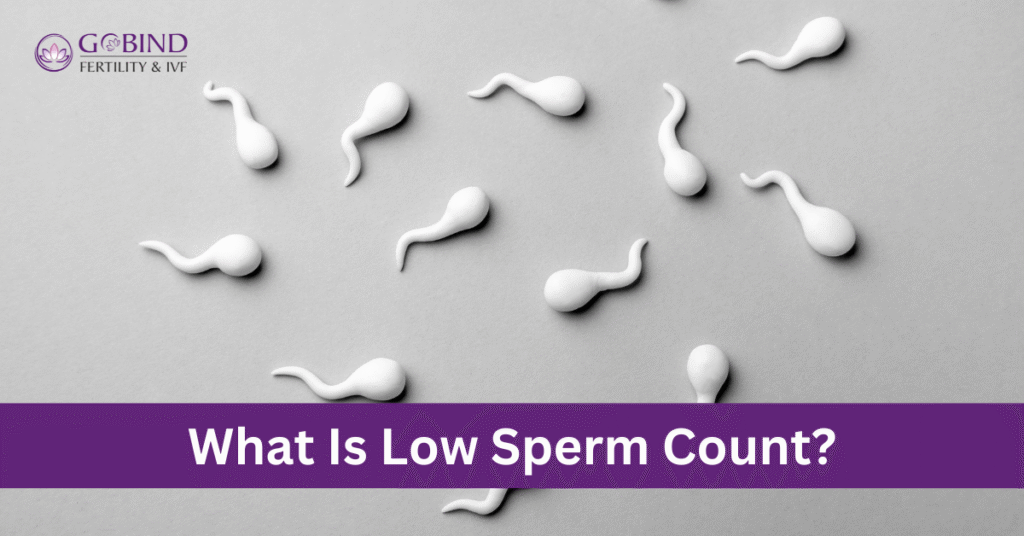Low Sperm Count: Causes and Solutions

Low sperm count, also known as oligospermia, is one of the most common causes of male infertility. It refers to a condition where the semen contains fewer sperm than the normal range. According to the World Health Organisation (WHO), a healthy sperm count is 15 million sperm per millilitre (ml) of semen or more. Anything lower than this may reduce the chances of conception.
Understanding the causes, symptoms, and solutions for low sperm count can help couples struggling with infertility take the right steps toward treatment.
What is Low Sperm Count?
Low sperm count means that the semen ejaculated during orgasm contains fewer sperm cells than required for fertilization. While it only takes one sperm to fertilize an egg, the chances of conception drop significantly when the overall number of sperm is low.
Common Symptoms of Low Sperm Count:
- Difficulty conceiving despite regular, unprotected sex
- Problems with sexual function (erectile dysfunction, reduced libido)
- Pain or swelling in the testicular area
- Reduced body or facial hair (indicating hormonal imbalance)
Causes of Low Sperm Count
Several factors can impact sperm production and quality. Some are medical, while others are lifestyle-related.
1. Medical Causes
- Varicocele: Swelling of the veins within the scrotum that affects sperm production.
- Hormonal Imbalances: Low testosterone or issues with the pituitary gland.
- Infections: STIs, mumps, or other infections that damage sperm health.
- Ejaculation Issues: Retrograde ejaculation (sperm enters bladder instead of exiting penis).
- Genetic Disorders: Chromosomal defects like Klinefelter’s syndrome.
2. Lifestyle Factors
- Excessive alcohol, smoking, and drug use.
- Stress and poor sleep patterns.
- Being overweight or obese.
- Excessive heat exposure (sauna, hot tubs, tight underwear).
- Lack of physical activity.
3. Environmental Causes
- Exposure to toxins, pesticides, and heavy metals.
- Radiation or prolonged use of laptops/mobile phones near the groin.
Solutions for Low Sperm Count
The treatment of low sperm count depends on its underlying cause. Some cases may only require lifestyle changes, while others may need medical intervention.
1. Lifestyle Changes to Improve Sperm Count
- Quit smoking and limit alcohol consumption.
- Eat a balanced diet rich in vitamins and antioxidants (Vitamin C, Vitamin E, Zinc, Folate, Omega-3).
- Maintain a healthy weight through regular exercise.
- Reduce stress with yoga, meditation, or mindfulness.
- Avoid excessive heat exposure to the testicles.
2. Medical Treatments
- Hormone Therapy: For men with hormonal imbalances.
- Surgery for Varicocele: Helps improve sperm count and quality.
- Antibiotics: To treat infections affecting sperm health.
- Medications: To improve ejaculation and sperm production.
3. Advanced Fertility Treatments
When natural conception is difficult, assisted reproductive technologies (ART) can help:
- IUI (Intrauterine Insemination): Sperm is directly placed in the uterus.
- IVF (In-Vitro Fertilisation): The Egg is fertilised outside the body and then implanted.
- ICSI (Intracytoplasmic Sperm Injection): A single sperm is injected directly into the egg.
Final Thoughts
Low sperm count is a growing concern, but it is treatable in most cases. With timely medical consultation, lifestyle improvements, and advanced fertility treatments, many men can achieve healthy sperm counts and improve their chances of fatherhood.
If you and your partner are struggling to conceive, consult a fertility specialist who can diagnose the cause and suggest the best treatment options.
